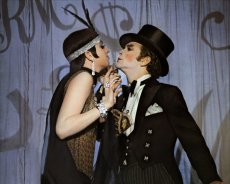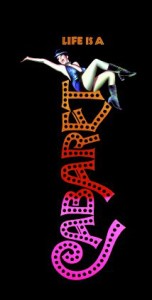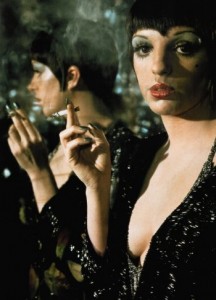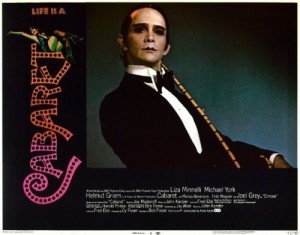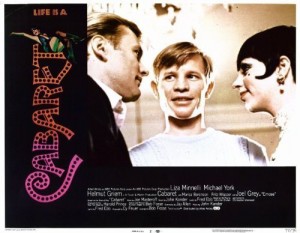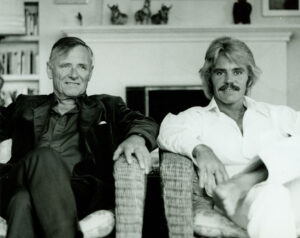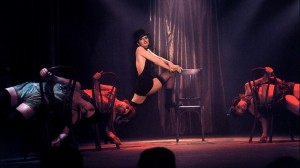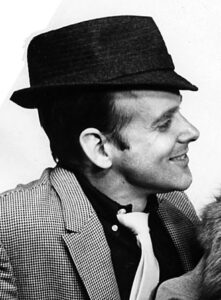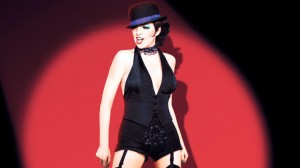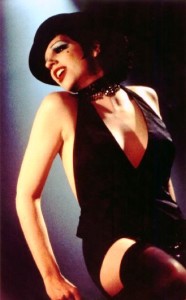Cabaret ***** (1972, Liza Minnelli, Michael York, Joel Grey, Helmut Griem, Marisa Berenson, Fritz Wepper) – Classic Movie Review 206
Bob Fosse’s sensational 1972 American musical period drama film Cabaret is the winner of eight Oscars, including Best Director (Fosse), Best Actress (Liza Minnelli), and Best Supporting Actor (Joel Grey).
Bob Fosse’s sensational 1972 American musical period drama film Cabaret is the winner of eight Oscars, including Best Director (Fosse), Best Actress (Liza Minnelli), Best Supporting Actor (Joel Grey), Best Cinematography (Geoffrey Unsworth) and Best Art Direction (Rolf Zehetbauer).
Disappointingly, it missed out on Best Film and Screenplay though, and it holds the record for most Oscars earned by a film not honoured for Best Picture.
Fred Ebb and John Kander’s beguiling adult musical, with its super score enhanced by two new songs, ‘Mein Herr’ and ‘Money Makes the World Go Around’, plus especially an extra song they composed back in 1964 ‘Maybe This Time’, shows the way to turn a great Broadway show into a great movie.
The film is based on Christopher Isherwood’s semi-autobiographical stories about the divinely decadent Weimar-era Berlin during the Jazz Age.
Bob Fosse’s direction and choreography are a tour-de-force of style and sophistication, encouraging his 26-year-old star Liza Minnelli to dazzling heights. The showstopping Minnelli has never been better than here as nightclub singer Sally Bowles and she won an Oscar as best actress, kicking up a storm as actress, singer and dancer.
Her character, though Americanised from the original English character and way too professional (why would she be toiling in a seedy joint like the Kit Kat Klub if she’s this wonderful?), is otherwise exactly right. She’s both maddening and appealing as well as desperately yearning (especially as she sings ‘Maybe This Time’) for something somewhere over the rainbow.
It’s also by far the best thing Joel Grey has ever done as the creepy MC of 30s Berlin’s Kit Kat Klub, where Sally performs for the increasing numbers of Nazis in the audience. Grey, commandingly repeating his Broadway stage role, is splendidly creepy in a lurid, knockout performance that’s simultaneously repelling and compelling.
Though he physically looks uncannily more like Christopher Isherwood’s poet friend WH Auden, who was part of his social circle in Berlin, than Isherwood himself, the otherwise ideally cast Michael York is a class act as the semi-autobiographical alter ego character of the British gay writer Christopher Isherwood (1904-86).
He is depicted here as Brian Roberts, a bisexual Englishman torn between his love for Liza Minnelli’s Sally and gay aristocratic German hunk, rich playboy Maximilian (Helmut Griem). Max promptly seduces both of them.
The film perfectly conjures up the mood of divine decadence in pre-World War Two Berlin just before Germany’s takeover by the Nazis, and shows the start of the mindless terror there for Jews, homosexuals, gypsies, the handicapped and other outcasts.
The musical numbers all take place inside the Kit Kat Klub, except for the scary anthem ‘Tomorrow Belongs to Me’ a nationalistic song sung by a Nazi Hitler Youth singer (Oliver Collignon, singing voice of Mark Lambert) and the German crowd.
Fosse hired Hugh Wheeler, a friend of Isherwood, to rewrite and revise Allen’s script but Wheeler was referred to as a ‘research consultant’ and Allen kept sole screenwriting credit. Wheeler went back to Isherwood’s stories to ensure a more faithful adaptation, restored the subplot about the gigolo and the Jewish heiress, and made the hero a bisexual man rather than the heterosexual of the stage musical.
Yet Isherwood wasn’t happy about the film: ‘The male lead is called Brian Roberts. He is a bisexual Englishman. He has an affair with Sally and later with one of Sally’s lovers, a German baron. Brian’s homosexual tendency is treated as an indecent but comic weakness to be snickered at, like bed-wetting.’
Jean Ross wasn’t happy about the film either. She felt the depiction of 1930s Berlin ‘was quite, quite different’ from reality.
Isherwood published the show’s semi-autobiographical source novel Goodbye to Berlin in 1939 just as World War Two started and he controversially left Britain with Auden to start a new life in America.
In 1929, Isherwood moved to Berlin to enjoy life as an openly gay man and the city’s libertine nightlife. There he shared lodgings with Jena Ross, a British cabaret singer and aspiring film actress from a wealthy Anglo-Scottish family, who provided him with the character of Sally Bowles. They met wealthy playboy John Blomshield, who sexually pursued both of them and inspired the character of Baron Maximilian von Heune.
Blomshield abruptly disappeared without a word of goodbye, and Ross became pregnant with the child of Peter van Eyck, who abandoned her.
Then, as the political situation rapidly deteriorated in Germany, Isherwood and other British nationals realised that they must flee the country
The Oscars went to: Best Director (Bob Fosse), Best Actress (Liza Minnelli), Best Supporting Actor (Joel Grey), Best Cinematography (Geoffrey Unsworth) and Best Art Direction/ Set Decoration (Rolf Zehetbauer, Hans Jürgen Kiebach, Herbert Strabel), Best Film Editing (David Bretherton), Best Sound (Robert Knudson, David Hildyard), Best Scoring: Adaptation and Original Song Score (Ralph Burns).
At the Golden Globes it won Best Motion Picture – Musical or Comedy, Best Actress in a Motion Picture – Musical or Comedy and Best Supporting Actor – Motion Picture.
Joe Masteroff’s book of the 1966 musical play comes via John Van Druten’s 1951 stage version I Am a Camera (filmed as I Am a Camera in 1955).
Four-letter words are cut in the TV version.
The wonderful 2013 London stage revival with Will Young and Lynn Paul shows how excellent the original show is, much darker than the film and the gay element is more prominent.
Bob Fosse (June 23, 1927 – September 23, 1987)
Herbert Strabel, the Oscar-winning set dresser on Cabaret, died at 90 on 21 October 2017.
Helmut Griem (6 April 1932 – 19 November 2004).
Fritz Wepper (17 August 1941 – 25 March 2024) is best known for his role as Inspector Harry Klein in the long-running crime series Derrick (1974–1998).
Rolf Zehetbauer (13 February 1929 – 23 January 2022).
The cast
The cast are Liza Minnelli as Sally Bowles, Michael York as Brian Roberts, Helmut Griem as Baron Maximilian von Heune, Joel Grey as the master of ceremonies, Fritz Wepper as Fritz Wendel, Marisa Berenson as Natalia Landauer, Elisabeth Neumann-Viertel as Fräulein Schneider, Helen Vita as Fräulein Kost, Sigrid von Richthofen as Fräulein Mayr, Gerd Vespermann as Bobby, Ralf Wolter as Herr Ludwig, Ricky Renée as Elke, Estrongo Nachama as the cantor, Kathryn Doby, Inge Jaeger, Angelika Koch, Helen Velkovorska, Gitta Schmidt and Louise Quick as the Kit Kat Klub dancers, Oliver Collignon as the Hitler Youth singer, Mark Lambert as the singing voice of the Hitler Youth singer and Pierre Franckh as a Nazi.
© Derek Winnert 2013 Classic Movie Review 2o6
Check out more reviews on http://derekwinnert.com

